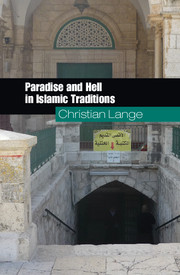Book contents
- Frontmatter
- Dedication
- Contents
- List of Figures
- List of Table and Charts
- Acknowledgements
- List of Abbreviations
- Note on Dates, Citation, Translations, and Transliteration
- Introduction
- Part I Textual Foundations: Narrating the Otherworld
- 1 The Otherworld Revealed: Paradise and Hell in the Qur'ān
- 2 The Growth of the Islamic Otherworld: A History of Muslim Traditionist Eschatology
- 3 Hope, Fear, and Entertainment: Parenetic and Popular Muslim Literature on the Otherworld
- 4 The Imagination Unbound: Two Late Medieval Muslim Scholars on Paradise and Hell
- Part II Discourses and Practices: Debating the Otherworld
- Epilogue
- Primary Sources
- Secondary Sources
- Index of Names
- Index of Terms
3 - Hope, Fear, and Entertainment: Parenetic and Popular Muslim Literature on the Otherworld
from Part I - Textual Foundations: Narrating the Otherworld
Published online by Cambridge University Press: 05 December 2015
- Frontmatter
- Dedication
- Contents
- List of Figures
- List of Table and Charts
- Acknowledgements
- List of Abbreviations
- Note on Dates, Citation, Translations, and Transliteration
- Introduction
- Part I Textual Foundations: Narrating the Otherworld
- 1 The Otherworld Revealed: Paradise and Hell in the Qur'ān
- 2 The Growth of the Islamic Otherworld: A History of Muslim Traditionist Eschatology
- 3 Hope, Fear, and Entertainment: Parenetic and Popular Muslim Literature on the Otherworld
- 4 The Imagination Unbound: Two Late Medieval Muslim Scholars on Paradise and Hell
- Part II Discourses and Practices: Debating the Otherworld
- Epilogue
- Primary Sources
- Secondary Sources
- Index of Names
- Index of Terms
Summary
Next to the extensive traditionist literature devoted to paradise and hell there is an important parenetic strand in the learned Muslim literature on the afterlife, as was suggested in the previous chapter. Although the boundary between these two branches is not always clear-cut, one may say that the latter is characterised by the selection of hadiths based primarily on their moralising content, at times also by the addition of significant hortatory comment to hadiths, and by a diminished interest in isnāds.
The roots of this parenetic tradition, like that of traditionist eschatology, reach back into the early centuries of Islam. At its beginning stand the preachers (quṣṣāṣ, sg. qāṣṣ) of early Islam, a class of religious experts who specialised in narrative exegesis of the Qurʾān and in moralising accounts of otherworldly bliss and torment. Analysis of the chains of transmitters of biblical stories (isrāʾīliyyāt) circulating in learned Muslim circles in the third/ninth century has brought to light a high percentage of non-Arab “clients” (mawālī, sg. mawlā) among the quṣṣāṣ of the first/seventh and second/eighth centuries, men who used their familiarity with biblical literature to carve out a place of honour and respect for themselves in the nascent Muslim community. The quṣṣāṣ preached the pleasures of paradise to those fighting in the early civil wars of Islam, but many of them were also known to practice a renunciant lifestyle (zuhd). This fits with the observation made in the previous chapter that collectors of zuhd traditions active in the second/eighth and third/ninth centuries often showed an interest in eschatological traditions.
The quṣṣāṣ were particularly successful in Egypt, one of the most fertile grounds for the growing imagery of the Muslim otherworld. Here they remained influential longer than in other areas. Around the year 81/700, they also thrived in Hims in Syria, where their representatives included famous men like Kaʿb al-Aḥbār (d. between 32/652 and 35/655) and Abū Umāma al-Bāhilī (d. 82/701 or 86/706). Under the Umayyad caliphs, they even came to function as a salaried “rudimentary clerus.” Their association with the Umayyads, however, precipitated their downfall.
- Type
- Chapter
- Information
- Paradise and Hell in Islamic Traditions , pp. 93 - 119Publisher: Cambridge University PressPrint publication year: 2015



